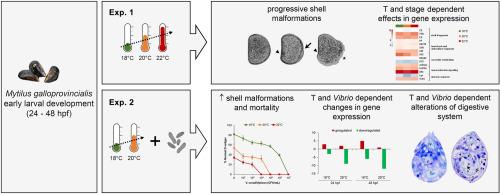海洋变暖对地中海贻贝早期发育的影响:对幼体对潜在弧菌病原体易感性的影响。
IF 4.1
2区 农林科学
Q1 FISHERIES
引用次数: 0
摘要
在全球变化的情况下,海洋变暖和病原体感染可能同时发生在沿海地区,威胁海洋物种。数据显示了温度对地中海贻贝(Mytilus galloprovincialis)早期幼体的影响。温度升高(18-20-22°C)会改变幼体 48 hpf 的表型,并影响从卵到 24 hpf 和 48 hpf 的基因表达,其中受影响最大的是壳生物发生相关基因。使用珊瑚弧菌评估了温度对幼虫感染易感性的影响,珊瑚弧菌是一种与双壳类动物死亡日益相关的珊瑚病原体,其生态受到全球变暖的影响。在温度较高和弧菌浓度较高的情况下,48 hpf 的幼体会出现畸形和死亡,并且会产生交互影响。在非致死条件下,也发现了 24 和 48 hpf 基因表达的交互作用。尽管温度是影响五倍子贻贝早期幼体的主要环境因素,但气候变暖可能会增加弧菌感染的易感性,从而对贻贝种群造成影响。本文章由计算机程序翻译,如有差异,请以英文原文为准。

Impact of ocean warming on early development of the Mediterranean mussel Mytilus galloprovincialis: Effects on larval susceptibility to potential vibrio pathogens
In a global change scenario, ocean warming and pathogen infection can occur simultaneously in coastal areas, threatening marine species. Data are shown on the impact of temperature on early larvae of the Mediterranean mussel Mytilus galloprovincialis. Increasing temperatures (18-20-22 °C) altered larval phenotypes at 48 hpf and affected gene expression from eggs to 24 and 48 hpf, with shell biogenesis related genes among the most affected. The effects of temperature on larval susceptibility to infection were evaluated using Vibrio coralliilyticus, a coral pathogen increasingly associated with bivalve mortalities, whose ecology is affected by global warming. Malformations and mortalities at 48 hpf were observed at higher temperature and vibrio concentrations, with interactive effects. In non-lethal conditions, interactions on gene expression at 24 and 48 hpf were also detected. Although temperature is the main environmental driver affecting M. galloprovincialis early larvae, warming may increase the susceptibility to vibrio infection, with consequences on mussel populations.
求助全文
通过发布文献求助,成功后即可免费获取论文全文。
去求助
来源期刊

Fish & shellfish immunology
农林科学-海洋与淡水生物学
CiteScore
7.50
自引率
19.10%
发文量
750
审稿时长
68 days
期刊介绍:
Fish and Shellfish Immunology rapidly publishes high-quality, peer-refereed contributions in the expanding fields of fish and shellfish immunology. It presents studies on the basic mechanisms of both the specific and non-specific defense systems, the cells, tissues, and humoral factors involved, their dependence on environmental and intrinsic factors, response to pathogens, response to vaccination, and applied studies on the development of specific vaccines for use in the aquaculture industry.
 求助内容:
求助内容: 应助结果提醒方式:
应助结果提醒方式:


